Canada's federal election starts on Monday in the aftermath of incumbent Prime Minister Justin Trudeau's ethics scandal, with Liberal and Conservative leading the polls in a neck-and-neck situation.
CBC's opinion polling showed that the ruling Liberal is statistically tied with the Conservative with the supporting rate of 31.6 percent versus 32 percent. The New Democratic, gaining 18.4 percent of support, ranks third, following the Green Party and the Bloc Québécois which receive 7.5 and 7 percent respectively.
Main players on the field
Since leader of the party wins the most seats in the House of Commons becomes prime minister, facing the neck-and-neck race, let's take a look at profiles of the main players in the race.
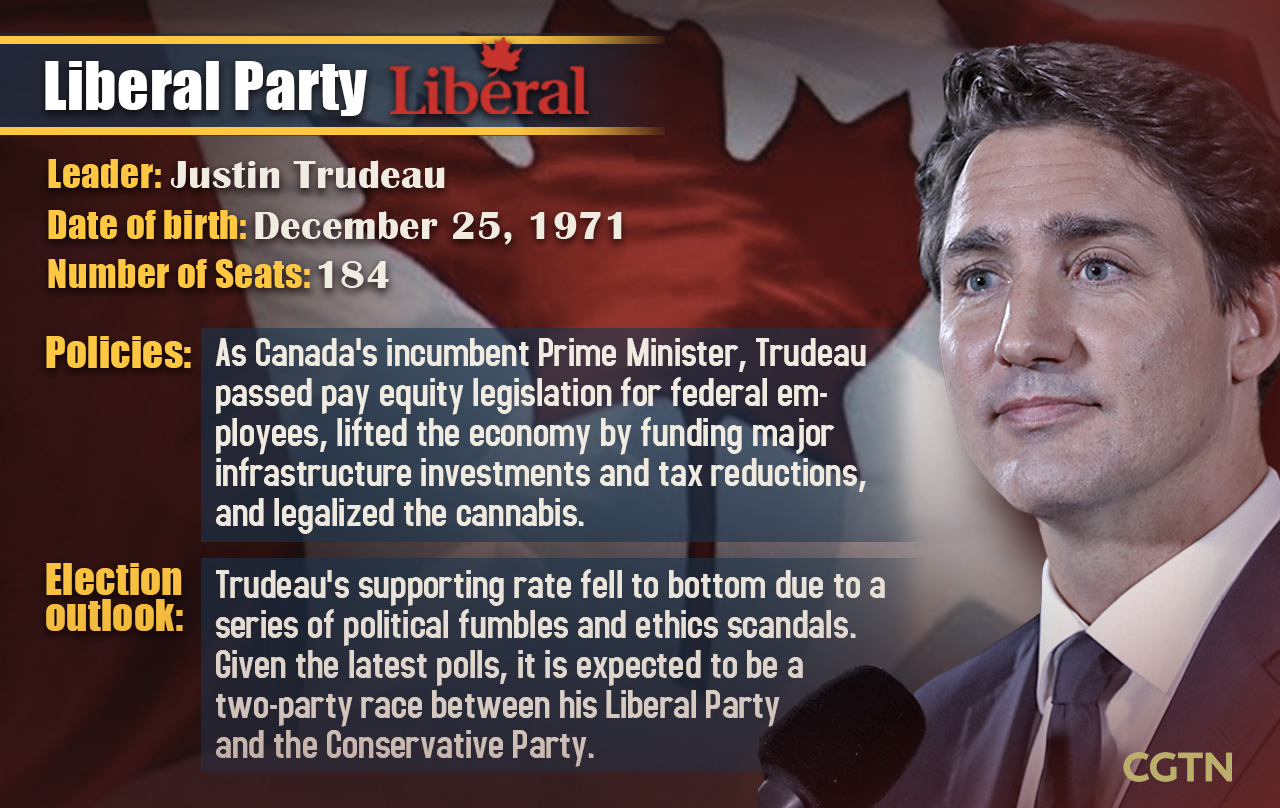
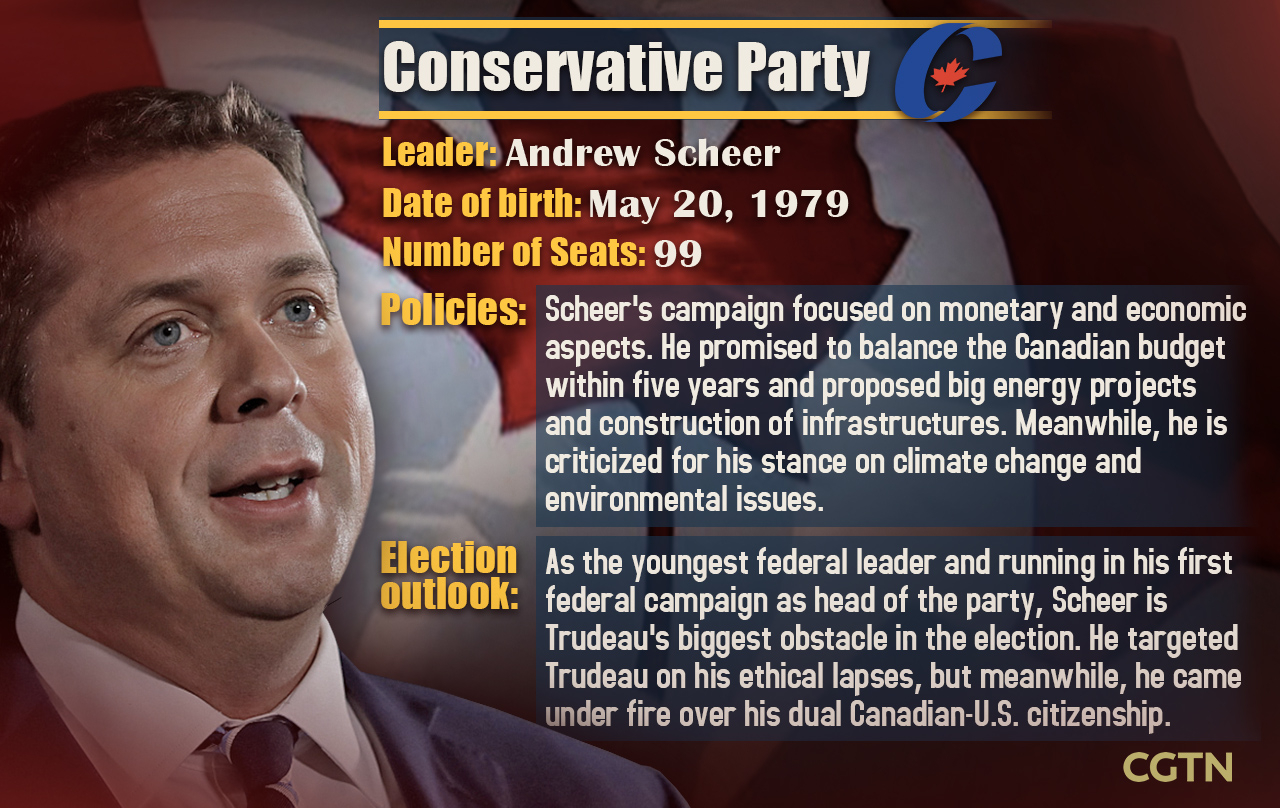
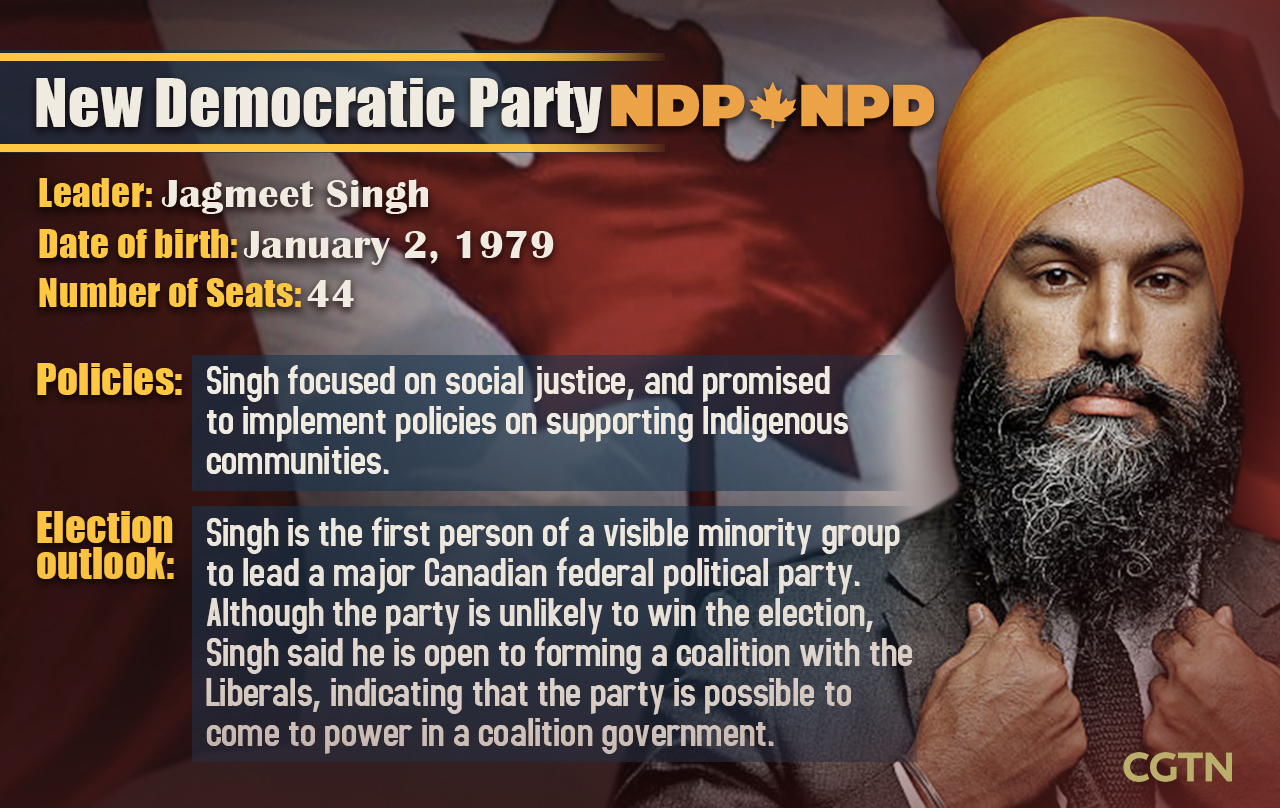
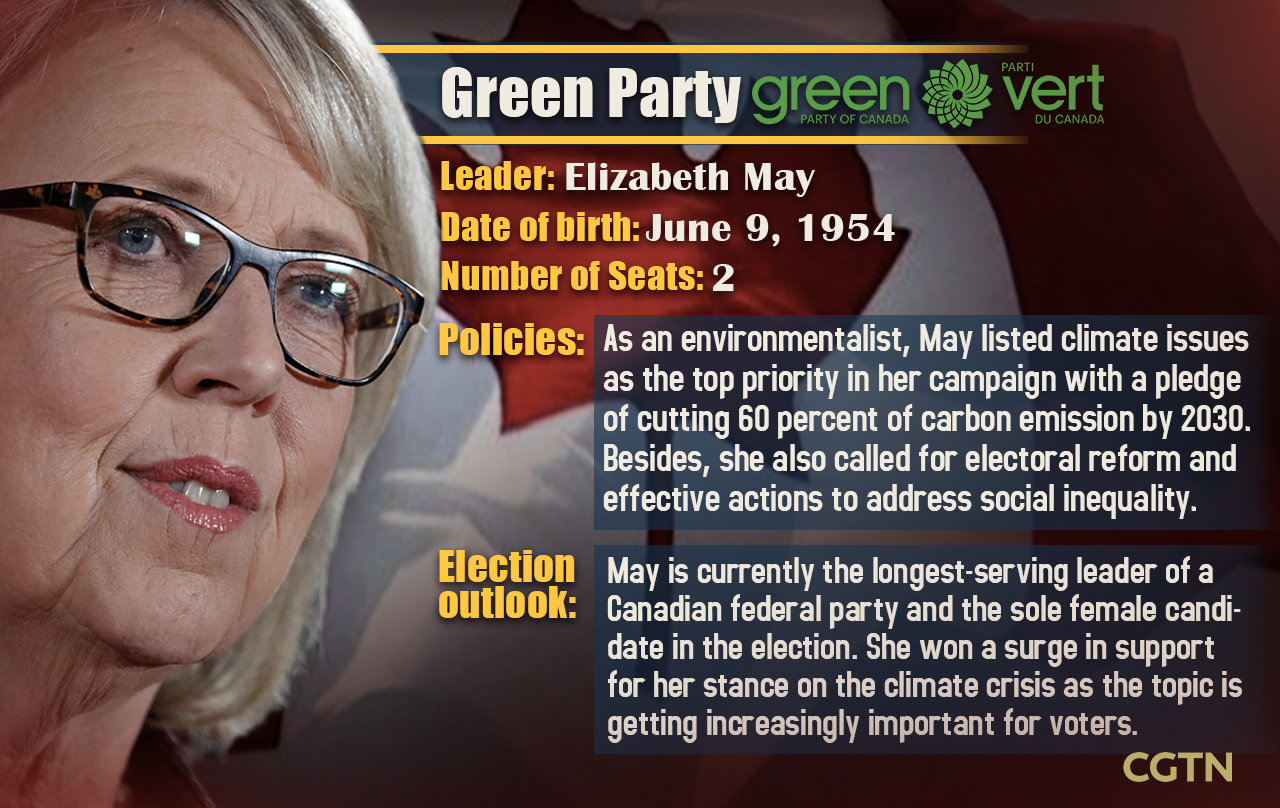
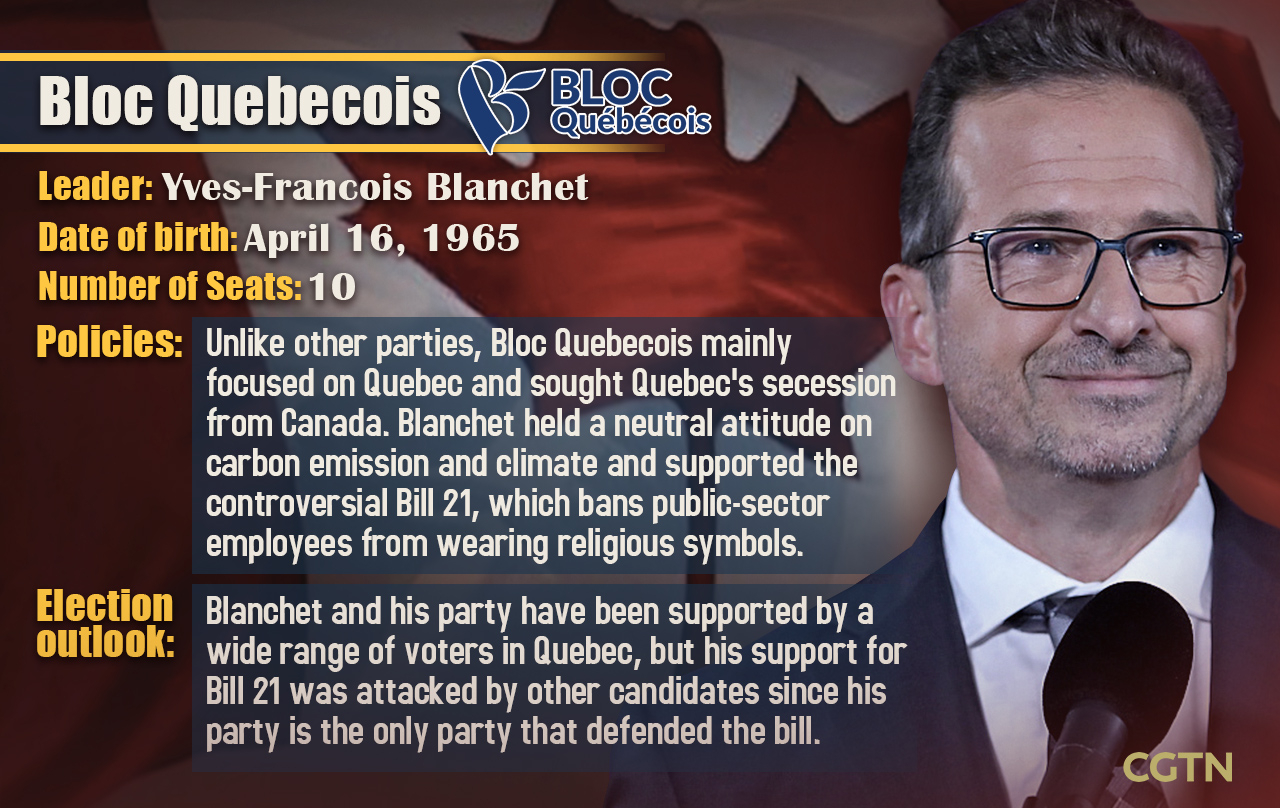
Although it is hard to project the results given the tight supporting rate, experts suggest that a majority government is unlikely. A coalition is possible to be formed.
Singh, leader of the New Democratic Party that ranks third in polls, last Sunday signaled that he could form a coalition with the Liberals in order to "keep the Conservative from assuming power."
"We're not going to support a Conservative government… we're going to fight it all the way. We're ready to do whatever it takes," said Singh.
He then listed aspects that the two parties could join forces, including climate change actions, affordable housing and tax on the "ultra-rich."
Trudeau dodged questions on the possible coalition by stressing that he remained focused on winning a majority without ruling out the option.
While Blanchet, leader of the Bloc Quebecois said he has no interest in forming a coalition, as the party is "more within Quebec," adding that he would support any government on any issue as long as the policy is good for Quebec.
For the Green Party, May dismissed the possibility of forming a coalition with Scheer's Conservative given their "irreconcilable" positions on climate change. Nevertheless, analysists believed that collaboration between the Green Party and the Liberal would also be tough when it comes to fossil fuel emission and climate change.
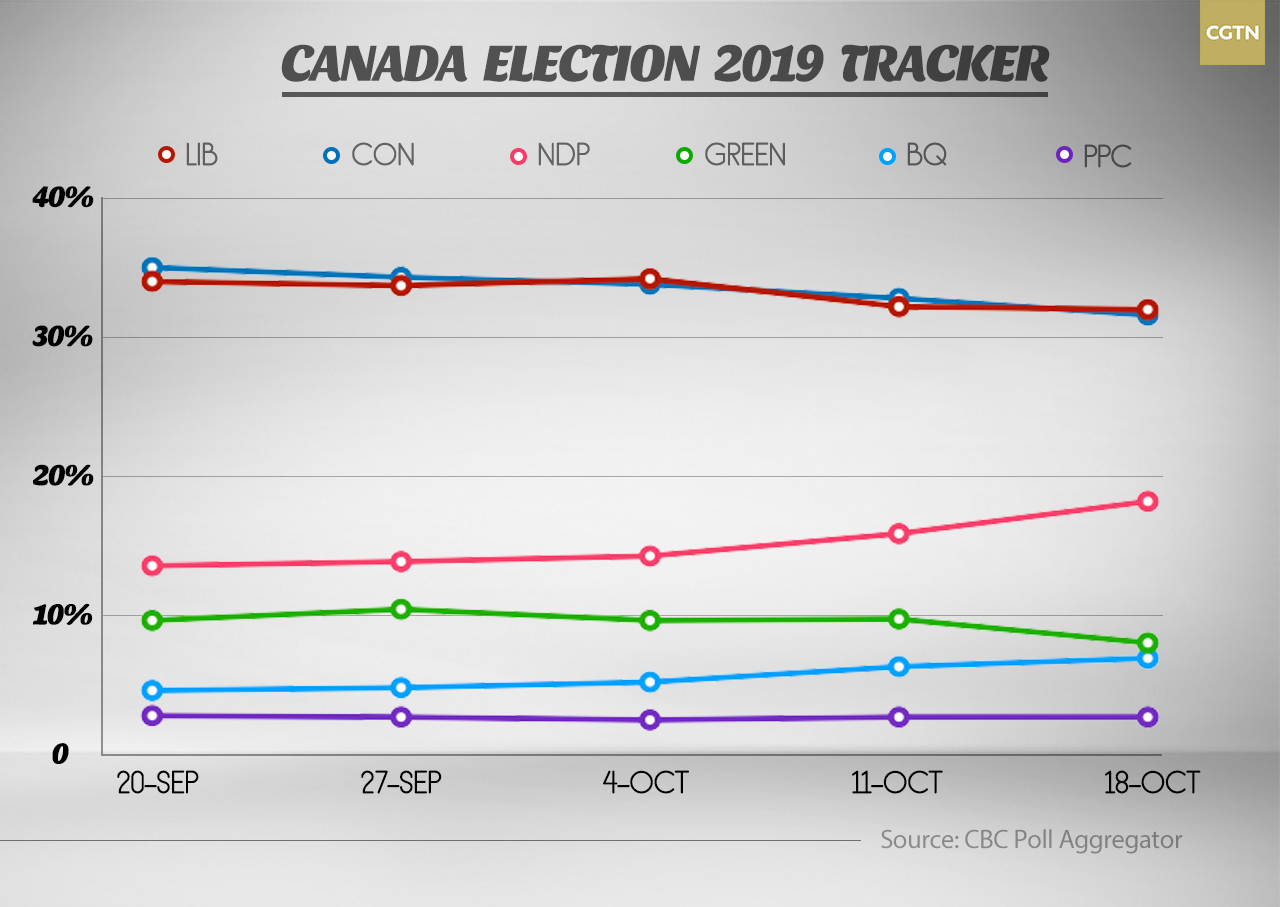
Leaders of major parties attended several tit-for-tat public debates over their policies as well as their personal background. Trudeau and Scheer, not surprisingly, are main targets.
Economy and taxes
Economy is always the top on the agenda facing the rising tide of protectionism and global economic slowdown.
Trudeau promised to balance Canada's budgets by the end of his mandate and to run annual deficits of no more than 10 billion U.S. dollars.
While Scheer accused Trudeau's administration of failing to deliver on his promised infrastructure spending of 187 billion U.S. dollars and creating a "troubling signs" by putting Canada in an economic downturn.
The Conservative leader proposed a tax reduction plan in order to tackle the economic downturn and promised to boost the economy by attracting more investment in big energy projects and balancing the finance.
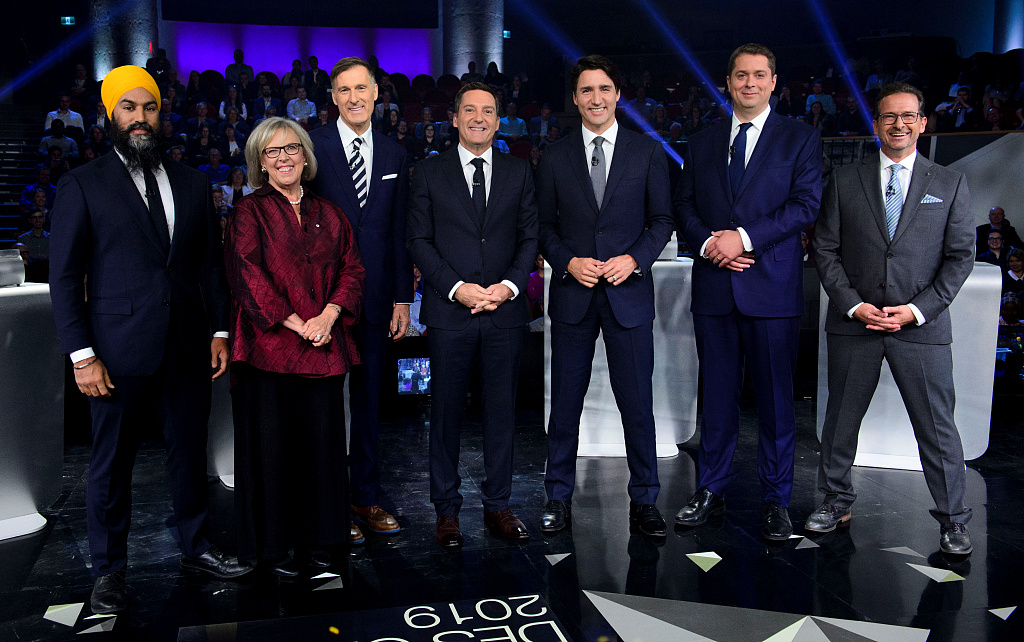
Host Patrice Roy from Radio-Canada, centre, introduces Federal party leaders, left to right, NDP leader Jagmeet Singh, Green Party leader Elizabeth May, People's Party of Canada leader Maxime Bernier, Liberal leader Justin Trudeau, Conservative leader Andrew Scheer, and Bloc Quebecois leader Yves-Francois Blanchet before the Federal leaders French language debate in Gatineau, Quebec, Canada, October 10, 2019. /VCG Photo
Host Patrice Roy from Radio-Canada, centre, introduces Federal party leaders, left to right, NDP leader Jagmeet Singh, Green Party leader Elizabeth May, People's Party of Canada leader Maxime Bernier, Liberal leader Justin Trudeau, Conservative leader Andrew Scheer, and Bloc Quebecois leader Yves-Francois Blanchet before the Federal leaders French language debate in Gatineau, Quebec, Canada, October 10, 2019. /VCG Photo
Environment and energy
Given the growing public attention to climate change and environmental protection, the topic becomes one of the major focuses in the public debate as well as an aspect where leaders' position varies greatly.
The Liberals take national pricing on carbon emissions as central to their climate policies. The federal government under Trudeau's administration, required all provinces to set a minimum level of carbon pricing, while his opponent Scheer opposed the "unfair tax on everything" and vowed to levy tax on large industrial polluters and reduce carbon emission through advanced technology.
May, as a firm environmentalist, listed the climate issue as the party's priority and proposed to address the climate change with a 20-step action plan. She was also unsatisfied with Trudeau's carbon pricing policy, but unlike Scheer, she believed that the price should be higher so that the country can realize a 60 percent reduction of carbon emission by 2030.
Social issues
For Trudeau, apart from sticking to his old policies, the incumbent prime minister unveiled a gun-control plan as a way to tackle shootings while his major competitor Scheer, as an gun owner, has long been advocated for "honest firearms owners."
On the other hand, as a leader who belongs to a visible minority group, Singh's policies concentrate on social justice. He promised to implement policies on supporting indigenous communities and to create more affordable housings.
While Blanchet, criticized badly over his party's approval of the contentious Bill 21–a law which forbids public servants in Quebec from wearing religious symbols, clashed sharply with Trudeau who holds an relatively open attitude to religious policies.

Liberal Leader and Canadian Prime Minister Justin Trudeau greets supporters as he takes part in a campaign rally ahead the federal election, Vaughan, Canada, October 18, 2019. /VCG Photo
Liberal Leader and Canadian Prime Minister Justin Trudeau greets supporters as he takes part in a campaign rally ahead the federal election, Vaughan, Canada, October 18, 2019. /VCG Photo
Scandals
Following the SNC Lavalin scandal earlier this year to last month's brownface pictures, Trudeau has been struggling in saving his bottomed-out popularity and reviving from a series of political fumbles and ethical lapses.
His components, not surprisingly, grasped the chance and rebuked Trudeau's progressive credentials. Scheer called on the Canadians "not to trust Justin Trudeau," accusing him of being "incapable of being honest with Canadians."
However, Scheer himself is not "clean." Being found having a dual Canadian-U.S. citizenship, the Conservative leader was forced to acknowledge the truth while stressing that he began the process of giving up his American citizenship in August.
Considering the neck-and-neck polling and tit-for-tat debates and rebukes, the question whether Trudeau would manage to revive from his political fumble and win a second term remains unknown.